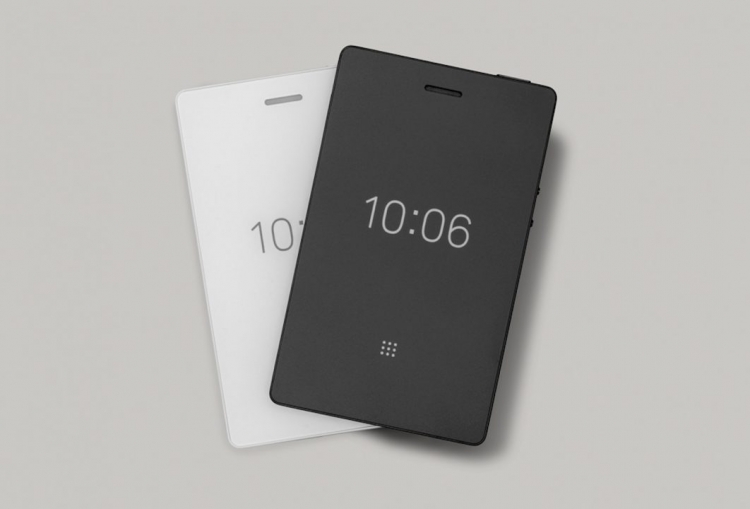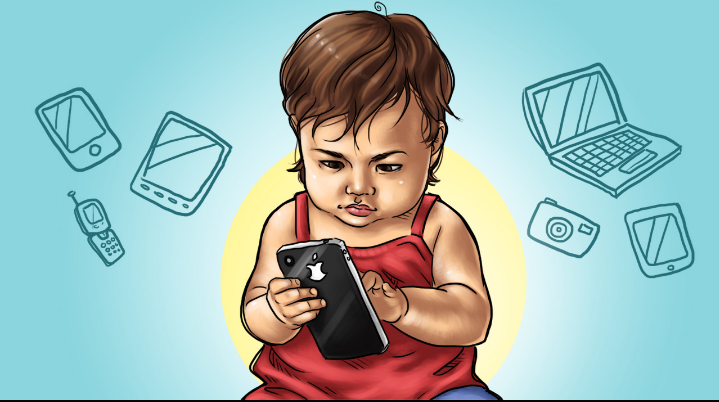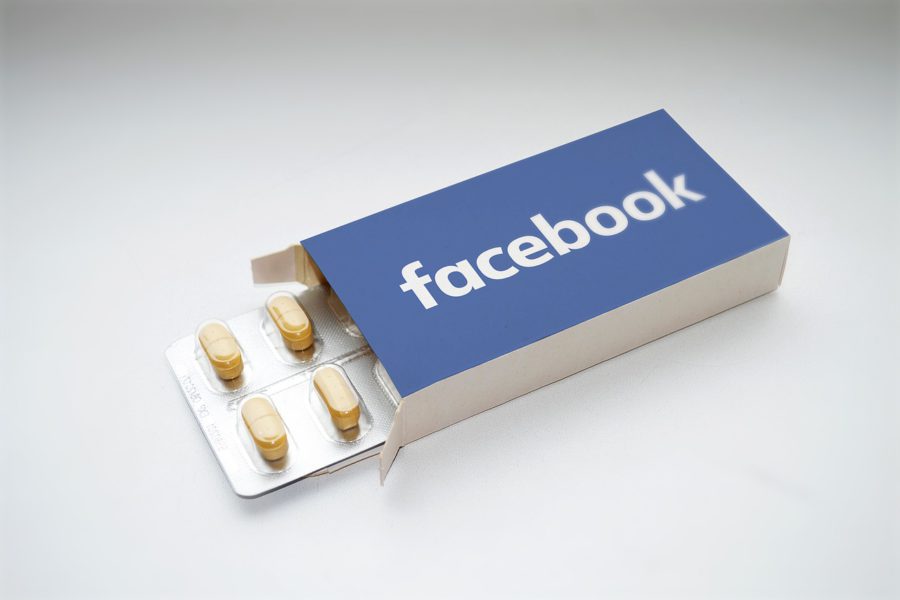On the meaning of the controversy over gadget addiction, the history of the issue and the transfer of the problem to the smartphone aspect …

Original material
The term “smartphone addiction” has entered our cultural lexicon relatively recently, we can say that it is a fait accompli. And this fact is increasingly cited by techno skeptics and authors of books on working on ourselves in order to cash in on our natural desire to banish unhealthy habits from our lives. Let's not mention the ever-popular fear of being followed. Some people are returning to push-button mobile devices to avoid the horror that smartphones have brought to our lives. In short, the ubiquity of smartphones has made them the New Source of All Your Problems ™. And I think we are a little ahead of ourselves, despite all our best intentions (to live more in the moment, increase the number of important interactions, sleep more).
The idea that smartphones somehow negatively impact our lives has an understandable appeal. First, it is reductive. This thought correlates complex and detailed concepts (our dissatisfaction, anxiety and problems) with a small 'bar' that we carry with us all day. We can all admit it. Secondly, this idea appeals to romantic nostalgia. Don't you remember what it was like to walk with a phone that you can only call and write messages on? What time we lived! After all, we were paying attention to the real world a lot more before [insert the name of the technology that made everyone's life so much better], right?

As you probably know, the rapid rise in anxiety over the issue of smartphone addiction is hardly unique – it's just another milestone in a long history of people ending their trust in technology that is radically changing lives. In 1858, people sincerely believed that the invention of the telegraph with almost instant messaging would degrade the quality of news coverage. Subsequently, the decomposition of society caused the transition to the telephone. Personal computers also took part in the next 'attack' of anxiety, I especially like the following quote about the phenomenon of computer phobia.
In the early 1980s, the era of computers began, and suddenly 'computer phobia' was taking over. Women and Computers, a 1996 book, describes the experiences of sufferers' fear, anxiety, hostility, and rejection. These manifestations reached the fear of physically touching the computer or damage to it or its internal components, unwillingness to read or talk about computers, aggression towards them, fear of those who know something about them, feelings that we will soon be replaced by machines, will do their slaves. '
Video games, television, and the Internet itself have become targets of similar (and seemingly endless) swings of panic. The articles describing their bad impact on society are impossible to count, and the topic has become a target of search engine optimization. This response is not limited to technology. The very fact of the newfound popularity of something, especially among young people, is often enough to sound the cultural alarm. In 1859 Scientific American magazine published an article on how a very popular pastime was corrupting the minds of young people. It was about chess. Yes, a board game that has become a cultural synonym for the intelligentsia.
Smartphones have not been honored to be the first cellular device to be accused of undermining the fabric of society: even the humble push-button telephones, which have become the de facto symbol of what appears to be the growing blackout movement, were accused a decade ago of being 'killed' face-to-face interactions. Earlier, in the 90s, pagers were hit in the neck, when their popularity among teenagers skyrocketed and when they were widely banned in schools for the reason that they were used by drug dealers. In case you didn’t understand the causal relationship, adults thought that children would become addicted to drugs through pagers.
All controversy about the addictive nature of new technologies has long been settled. And the technology was winning every time.

However, you can say that things are different with smartphones. We now have advanced artificial intelligence, powered by social media, designed to trigger a series of dopamine reactions that we get hooked on. In fact, Facebook is a drug, we have not seen anything like it yet. And again we are running ahead of the engine: people were saying the same thing about correspondence from push-button telephones and dopamine reactions in 2010. After all, we know that after the widespread adoption of texting, people simply stopped speaking out loud – we were all rushing to respond to another 'ding ding'.
Is it starting to look like something?
Sarcasm aside, the crux of the matter is that all the technology addiction debate has already been resolved. And technology has always won. Video games have been part of the addiction and moral debate for decades, and the industry is showing no signs that it is about to stall. 'Marathon' television viewing has become culturally acceptable. But I remember a time when a multi-hour TV session was considered almost one hundred percent way to turn your brain into mush.
Flicking through Facebook and Twitter while waiting for a friend or on the train is not nearly as harmful as the countless hours I spent in Diablo II high school and World of Warcraft in complete isolation from the outside world in college.
If you feel like you can't trust yourself to use social media responsibly, then maybe it's time to think about whether it's time to uninstall this app. But this is a purely personal decision, and it is not a symptom of how we blame social media and smartphones for all our troubles. If I could repeat everything, knowing myself today, then I most likely would not have spent so much time playing video games, it would be pointless. But I don't blame video games for the decisions I make. The problem was not in the games, but in the fact that I did not understand how my own actions were harming me. But this is the essence of growing up: learning from the mistakes of youth to form an adult.

And so I sit on the eve of my 30 years and look at a growing number of people who openly decry the smartphone as a technology that has made our lives less happy, because of which they live to their fullest. I notice how few of these voices belong to the modern generation. Children who have grown up with smartphones, for the most part, do not seem to consider the issues raised as relevant. Do some of them spend too much time in Facebook, Twitter or Instagram? Undoubtedly. But I don't think we are seeing the collapse of civil society or its transformation into mindlessly engulfing media content robots that do not take their eyes off the screens. We just witnessed a new chapter in the history of the development of our relationship with the technologies that changed the world, which I talked about. And really, what's so awful about stopping to capture a memorable moment or documenting your journey to share with family and friends on social media? I love seeing what people are up to, even if the content is sometimes frivolous.

This does not mean that we should let Facebook and Google do whatever they want. And this does not mean that these platforms cannot be used for bad purposes. Of course, you need to limit the potential of these platforms to misinform, cheat, show children the wrong content, or engage them in the wrong interactions. As with any new technology, we learn a lot about the potentially negative consequences from how these things are applied in the real world. I believe that some important discussions arise for this very reason.
It may not be just nostalgia or a desire to show that you may not actually be looking at your phone all the time that 'turning off' or switching to a push-button phone is attractive. I won't say that I understand this, but someone may find in this a better way to live. Many of us may check our phones too often, out of habit or reflexively rather than out of necessity. But how else could you spend these moments? I have a hard time believing that I'm missing out on deep and meaningful interactions by checking Twitter at a bar or reading the news while waiting for the meeting to begin. I think that many of us (not all) have an understanding of when it is possible to look at the phone without negative social consequences. I believe in people.
And over time, this conversation will lose relevance. Smartphones and platforms like Facebook will one day be replaced by new technologies and media forms, and the same controversy will rise again. We will be older and smarter and will be absolutely confident that this particular innovation, whatever it may be, will be the one that will help humanity rush down the cliff.
By David Ruddock
The good old crusade of modern Luddites against new technologies is already exhausted and has practically lost its passion. But a new round of struggle is not far off, and who knows, maybe this time the degree of battles will be higher.
I thought about it and realized that among my friends (peers and people of a different age) there are no such ardent opponents of the expansion of gadgets. Yes, there are those who, day or two a week, try to disconnect from the network to the maximum, there are those who do not really like this whole story, but they have resigned themselves. Like the author of the material, I believe in people and their ability to self-control and self-regulation. After all, it seemed that relatively recently, these same people quietly walked with Motorola C115 and existed quite well. Is it time to remember the old, or is there nothing wrong with the new?
